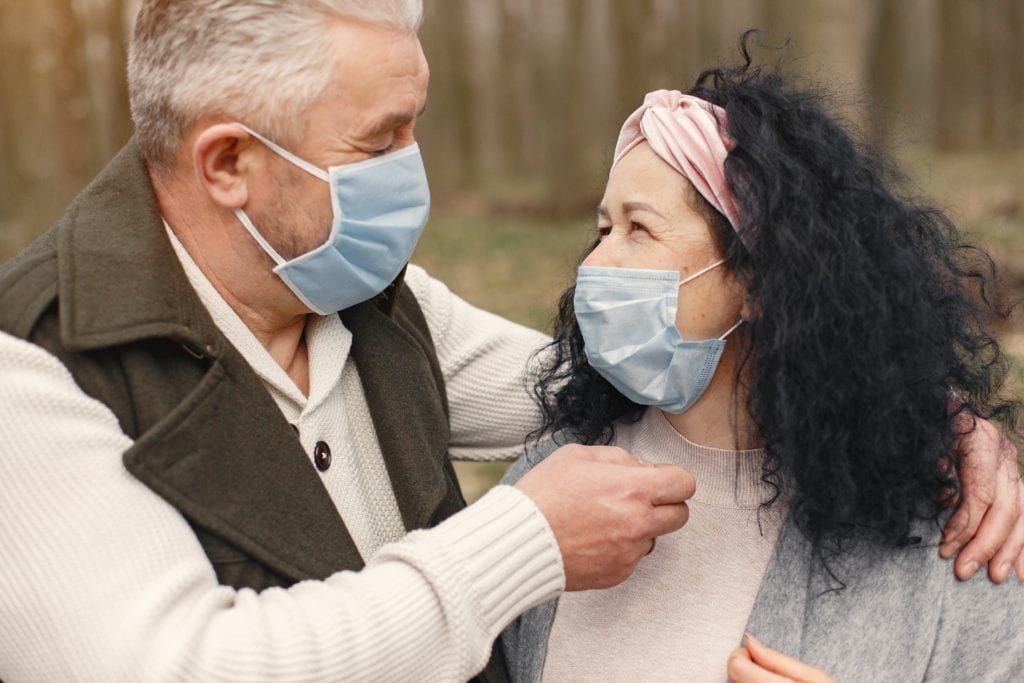
Masks
After I park, a petite, middle-aged woman quickly approaches my car, her hands protected by blue latex gloves, her olive colored face covered by a floral patterned homemade mask. It reminds me of the heather green one I wear each time I leave my house. As she gets closer, I see her large, kind, and friendly brown eyes peering above white piping. They belie the severe social measures the pandemic has induced.
I think of the Billy Idol song, “Eyes Without a Face.”
Best Buy has their merchandise pick-up process down to a science. You pull into a designated area, park, pull up their app, click on the “I’m at the store” button, and give a description of your car. Soon thereafter, an associate comes out, opens your back door or reaches into an open window, trunk, or hatchback, and places your order in your car. How much easier could it get?
On the one hand, all of us have come for good reasons. The Best Buy employees are earning a living. I’m purchasing a new router so that my family and I can Zoom—that is, use videoconferencing for work, school, and our social lives. We are simply doing life differently, these days, functioning in a new mode, adapting to what too many people describe as the “new normal.”
On the other hand, I feel the weight of a socially distant and faceless world.
Faces
As it turns out, seeing faces matters. A lot. The French philosopher Emmanuel Levinas points us to why this is so. He identifies the unique power of the human face to make claims on us and orient us in the world: “[T]he face speaks to me and thereby invites me to a relation,” and “it [is] a source from which all meaning appears.[1] More than this, face-to-face encounters obligate us to one another, meaning that with our faces we make moral and ethical claims on each other that are uniquely human. As Levinas puts it, “[T]he Other faces me and puts me in question and obliges me”[2] and “In front of the face, I always demand more of myself.”[3] I noted in another essay, Parkinson’s, Faces, and Sharing Our Humanity, that face-to-face encounters change us and humanize us precisely because they obligate us to one another. The faces of others call on us to become the best version of human we can become.
In 2010, the contemporary performance artist Marina Abramovic held an exhibition in the New York Museum of Modern Art. Titled “The Artist is Present,” she sat silently across a small table from strangers, one person at a time, as they each looked directly into one another’s eyes.[4] This continued for nearly 747 hours across six weeks. Having sat across from over 1500 people, Abramovic says it changed her forever: “completely—every possible element, every physical emotion.” She says, “This enormous need of humans to actually have contact, how we are so alienated from each other, how society makes us really distant. We are texting each other messages without seeing each other…so many stories of loneliness. What’s happening here? I’m looking at you.”[5]
Whether belonging to a loved one, neighbor, friend, colleague, student, Best Buy associate, or stranger, a face reminds us of our common humanity. Constantly concealing our faces protects our health, but also makes it harder to see each other, harder to recognize humanity, in others and in ourselves.
Zoom
Which brings me back to Zoom.
For six weeks and counting, Zoom gets me to work and my kids to school, piano lessons, and dance classes. Zoom takes my family to doctor’s appointments, and to virtual hangouts and happy hours with friends, whether in town or across the country. Feeling Zoomed-out on many days, I have wondered if we could all use a collective Zoomectomy!
Then, I remember.
When we Zoom, I get to see your face.
__________
[1] Emmanuel Levinas, Totality and Infinity (Pittsburgh, PA: Dusquesne University Press, 1999), 198, 297.
[2] Ibid., 207.
[3] Emmanuel Levinas, “Signature” 294 in Difficult Freedom: Essays on Judaism (Baltimore, MD: Johns Hopkins University Press, 1997). No page number.
[4] https://www.nytimes.com/2010/04/04/nyregion/04about.html
[5] https://vimeo.com/72711715
Photo by Gustavo Fring from Pexels
Allan Cole is a professor in The Steve Hicks School of Social Work at The University of Texas at Austin and, by courtesy, professor of psychiatry in the Dell Medical School. Diagnosed with Parkinson’s in 2016, at the age of 48, he serves on the Board of Directors at Power for Parkinson’s, a non-profit organization that provides free exercise, dance, and singing classes for people living with Parkinson’s disease in Central Texas, and globally via instructional videos. He also serves as a Community Advocate for ParkinsonsDisease.net, writing columns about living well with Parkinson’s. He is author or editor of 10 books on a range of topics related to bereavement, anxiety, and spirituality. Currently, he is writing a book on counseling people with Parkinson’s disease, which will be published by Oxford University Press. Follow him on Twitter @PDWise
